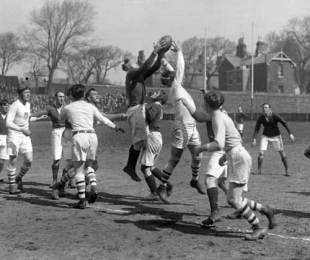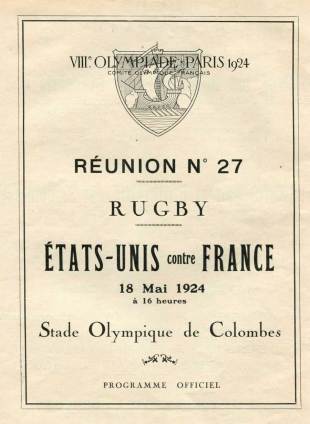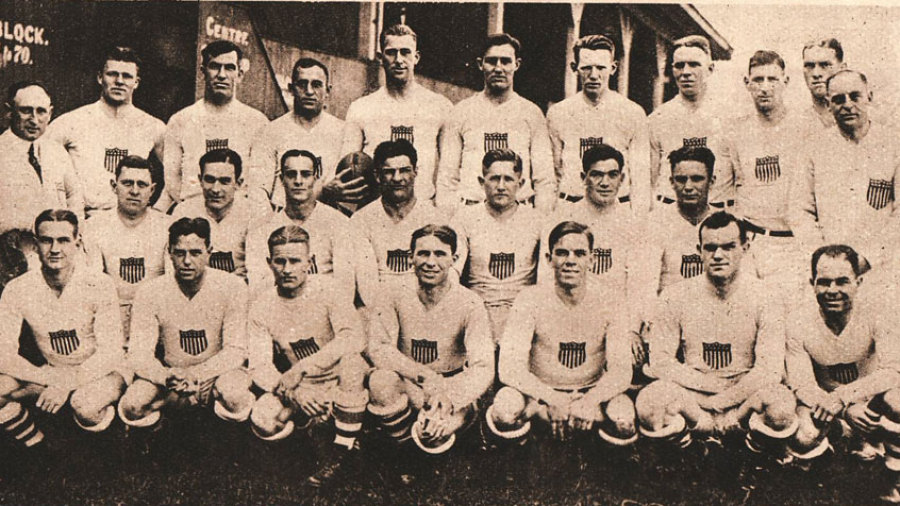|
1924
The despised Olympians
John Griffiths
May 15, 2014

The USA take on Romania at the 1924 Olympics © Getty Images
Enlarge
Ninety years ago this week France, Romania and the United States took part in the last Olympics to recognise rugby as a fully-fledged sport. Best remembered in athletics as the Chariots of Fire Games featuring Harold Abrahams and Eric Liddell, the Paris Olympiad went down as best forgotten in rugby circles because of partisan crowds, rough play and adverse publicity. Why no Home Unions entrants? The game's bye-laws imposed a strict close-season on rugby in Britain and Ireland between May 1 and August 31. Tournaments, moreover, were regarded as the thin edge of a professional wedge by the true-blue amateurs who ran the game. The relevant entry in the RFU minute-book dated April 9 1924 is terse: "Letter from British Olympic Association to the International Board re taking part in the Olympic Games: Secretary to inform the International Board that the Rugby Union had already decided not to do so." Rugby was America's Cinderella sport but enthusiastic Californian students and survivors of the 1920 Olympic tournament, which the US had won, resolved to defend their title. Most students were "beginners" in the rugby sense, looking to bridge leisure time between American Football seasons. So, in spring 1924, more than eighty hopefuls competed in a series of trials that culminated in March in the announcement of a 22-strong squad. Almost as soon as the side was picked, the US Olympic Committee disclosed that they were unable to finance what was described as "probably an embarrassing losing effort." Nevertheless, a fundraising committee in San Francisco helped the squad to pay their own expenses for the 6,000-mile trip from California to Paris. Then, on reaching New York to cross for England, the players learnt that their Olympic committee had made further attempts to spike ambitions by pronouncing that involvement was "hardly in the best interest of American sports."

The USA in action against Devenport in April 1924... they visited the south coast of England as part of their preparations
© Getty Images
Enlarge
Undeterred, the American players sailed for England to pick up Alan Valentine, who was a Yank at Oxford and already a rugby Blue. He inducted the side into the game's finer points, and three warm-up matches - against Devonport Services, Blackheath and Harlequins - were hastily arranged during Easter week before the team embarked for France. The British press didn't rate the US team very highly. The only victory in England was 25-3 at Devonport and critics felt American understanding of the game was elementary, though they were impressed by the team's quickness to learn, their fine condition and athletic build. Trouble in France soon followed. The side travelled ahead of the official USA Olympic Games party and their arrival, it seems, was unexpected. France had political history with the United States with resentment festering over post-war attitudes to Germany. President Woodrow Wilson's conciliatory tones in peace negotiations had contrasted sharply with French premier Georges Clemenceau's harder line. Officious customs officials at Boulogne immediately challenged the unheralded American rugby squad's right to be in France. Norm Cleaveland, a young five-eighth among the visiting party, recalled many years later: "We arrived there from England after the roughest boat ride most of us had ever experienced and were barely able to stagger ashore. We were told that our passports were not in order and that we had to return to England. However, there were not enough gendarmes on duty to enforce our deportation. We climbed some barricades before the American consul, in response to a riot call, hastily arrived to huddle with the agitated law-enforcement officials." Frantic behind-the-scenes negotiations among diplomats eventually paved the way for the Olympic guests to make their onward journey to Paris where the Yanks rejected the overpriced accommodation they were offered, preferring instead to make their own board and lodging arrangements. The Boulogne incident was blown out of proportion by the French press, who depicted the Americans as "street-fighters and saloon brawlers," but this became a grievance that the team used as motivation to succeed. The rugby tournament opened at Stade Colombes on Sunday May 4 with France hammering Romania. The score was 61-3 according to official Olympic statistics, but the FFR's record shows it as a 59-3 win. Scoring must have been so fast and furious that someone missed seeing a conversion. When the Romanians resorted to lying prostrate and feigning injury during a 37-0 defeat by the Americans a week later, a vociferous contingent in the crowd sympathised with them and hurled a barrage of anti-American abuse. French spectators directed cat-calls at the winners. Whatever had happened to the Olympic ideal of using sport to foster understanding among the nations?

The programme for the rugby section of the Games
© Scrum.com
Enlarge
France and the US met to decide the Olympic title on May 18. The Americans adopted a hybrid New Zealand/British field formation: a rover and half-back to operate the scrum; two five-eighths; three threequarters and a full-back behind seven forwards packing 3-4. A wider second-row and shallower scrum provided greater protection for the half-back and a faster heel which the American backs used to good advantage. Welsh referee Albert Freethy controlled the final, an honour he would with hindsight probably have preferred to have foregone. The crowd was enraged by strong American tackling and every time a Frenchman was brought down they hissed or booed. A riot threatened. France were overwhelming favourites and much had been wagered on the outcome. But when Adolphe Jauréguy, the star French three-quarter with wings in his boots, was concussed in the first half (and took no further part in the game), the crowd went berserk, only the steel fence surrounding the playing perimeter preventing them bursting onto the pitch. France were later reduced to 13 when another three-quarter, Jean Vaysse, wrenched his knee - and it could have been 12. Cleaveland remembered that a French forward was actually sent off by Mr Freethy in an incident that passed unreported by the press: "A French forward, clearly in the open, took a swing at our star back, Dick Hyland. The referee had no alternative but to eject the blatant offender. This caused an even greater uproar from the spectators. Our captain, 'Babe' Slater, tried to talk the referee into reversing his decision and finally convinced the endangered official to let the offender back into the game if 'Babe' would extend the invitation." Slater duly invited the Frenchman back, but with "poorly concealed condescension which was not appreciated by either the crowd or the French players," added Cleaveland. The minority American support, which included several cheerleaders, were attacked by a small section of French spectators irritated by their college chants. In the most serious incident, a student from Illinois was struck by an enraged French fan with a walking stick and had to be stretchered from the stadium unconscious, blood streaming from his face. It had been a very long rugby season in France. They had earlier beaten Scotland in the Five Nations, but their club Championship Final had been played only a week before the opening Olympic match. It was no surprise that, stale and lacking motivation, they fell 17-3 to the Americans, who needed a police escort to deliver them safely back to their dressing room and had to endure another outburst of crass behaviour when loud booing drowned out their national anthem at the awards ceremony. So rugby's chapter in Olympic history ended in a triumph against the odds for the Americans. But the episodes surrounding the tournament did little to promote rugby - or Olympian - values and, arguably, it was little wonder that fifteen-a-side rugby never again enjoyed full Games status. 
The 1924 USA side © Scrum.com
Enlarge
© ESPN Sports Media Ltd
|
Live Sports
Communication error please reload the page.
-
Football
-
Cricket
-
Rugby
-
- Days
- Hrs
- Mins
- Secs
F1 - Abu Dhabi GP
Abu Dhabi Grand Prix December 11-131. Max Verstappen ()
2. Valtteri Bottas (Mercedes)
3. Lewis Hamilton (Mercedes)
4. Alexander Albon ()
5. Lando Norris ()
6. Carlos Sainz Jr ()
-
ESPNOtherLive >>
Darts - Premier League
Golf - Houston Open
Snooker - China Open
Tennis - Miami Open

